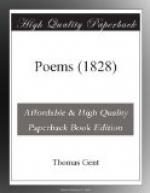“Pretty ladies, hold,”
Cupid said to the eyes—
For beauties that scold
“Are seldom wise;
“’Tis not colour I seek
“Love’s fires to impart—
“Give me eyes that can speak
“From the depths of the heart.”
EPIGRAM.
AURI SACRA FAMES.
I knew a being once, his peaked head
With a few lank and greasy hairs was spread;
His visage blue, in length was like your own
Seen in the convex of a table-spoon.
His mouth, or rather gash athwart his face,
To stop at either ear had just the grace,
A hideous rift: his teeth were all canine,
And just like Death’s (in Milton) was his grin.
One shilling, and one fourteen-penny leg,
(This shorter was than that, and not so big),
He had; and they, when meeting at his knees,
An angle formed of ninety-eight degrees.
Nature, in scheming how his back to vary,
A hint had taken from the dromedary:
His eyes an inward, screwing vision threw,
Striving each other through his nose to view.
His intellect was just one ray above
The idiot Cymon’s ere he fell in love.
At school they Taraxippus[1] called the wight;
The Misses, when they met him, shriek’d with
fright.
But, spite of all that Nature had denied,
When sudden Fortune made the cub her pride,
And gave him twenty thousand pounds a-year,
Then, from the pretty Misses you might hear,
“His face was not the finest, and, indeed,
He was a little, they must own, in-kneed;
His shoulders, certainly, were rather high,
But, then, he had a most expressive eye;
Nor were their hearts by outward charms inclined:
Give them the higher beauties of the mind!”
[Footnote 1: Greek: Taraxippus, a Grecian Deity; the god of the Hippodrome, literally, in English, horse-frightener.]
SONNET.
TO FAITH.
Hail! holy FAITH, on life’s wide ocean toss’d,
I see thee sit calm in thy beaten bark;
As NOAH sat, throned in his high-borne
ark,
Secure and fearless while a world was lost!
In vain contending storms thy head enzone,
Thy bosom shrinks not from the bolt that
falls:
The dreadful shaft plays harmless, nor
appals
Thy stedfast eye, fix’d on Jehovah’s throne!
E’en though thou saw’st the mighty fabric
nod,
Of system’d worlds, thou hear’st
a sacred charm,
Graved on thy heart, to shelter thee from
harm.
And thus it speaks:—“Thou art my
trust, O GOD!
And thou canst bid the jarring-powers be still,
Each ponderous orb, subservient to thy will!”
ON A SPIRITED PORTRAIT IN MY ALBUM,
Of a favorite Deer-hound, belonging to SIR WALTER SCOTT, by my friend, EDWIN LANDSEER, Esq.
Who in this sketchey wonder does not trace
The fire, the spirit, and the living grace,
That mark the hand of genius and of taste?
Who does not recognize in such a head
Truth, vigilance, fidelity, inbred,
Sagacity that’s human, and a waste
Of those high qualities, and virtues rare,
Which poor humanity has not to spare?




